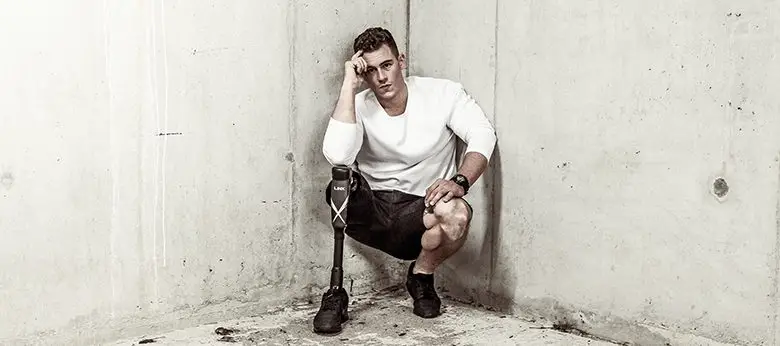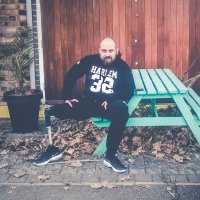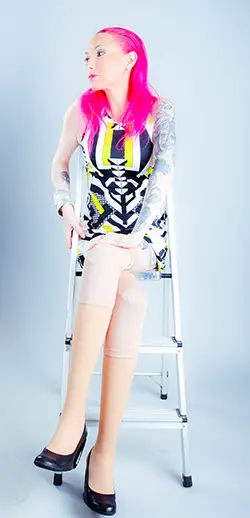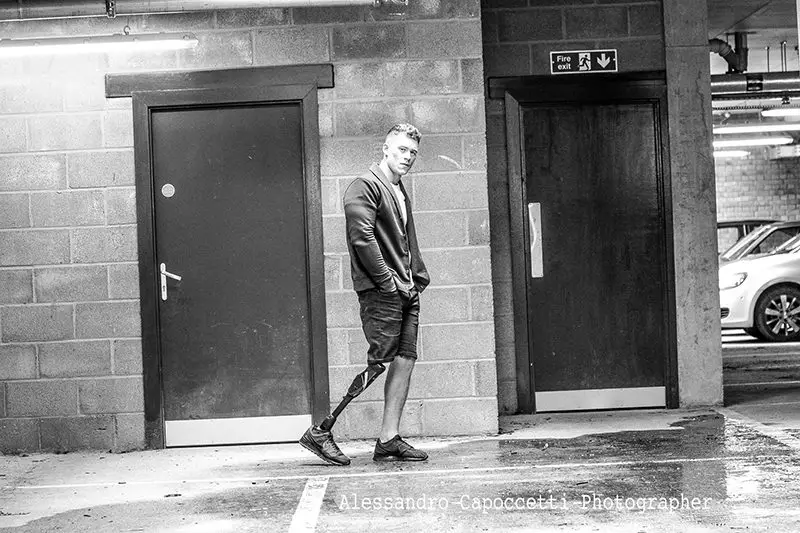
Be inspired by disabled photographer Alessandro Capoccetti
Photography often sparks passion, serving as a powerful means to shift views on disability too. Disabled photographer Alessandro Capoccetti shares his journey, his love for capturing moments, and his role in a documentary enlightening people about the vibrant, fulfilling lives lived by disabled individuals. These stories champion the idea that, much like a lens bringing a blurry scene into focus, perspectives can be broadened and enriched.
Please can you tell us a bit about yourself?
 I was born in 1979 in a village a called Avezzano, just a few kilometres from Rome. I have a rare condition called Syndrome Gollop Wolfgang. There are only around 200 cases of it reported worldwide.
I was born in 1979 in a village a called Avezzano, just a few kilometres from Rome. I have a rare condition called Syndrome Gollop Wolfgang. There are only around 200 cases of it reported worldwide.
The condition causes Aplasia/Hypoplasia of the tibia (shinbone), which essentially means I have skin missing. This is accompanied by pre-axial Oligodactyly or Monodactyly of the feet, where my toes are malformed or non-existant.
Around 80% of people with Syndrome Gollop Wolfgang have major Aplasia, often without metacarpophalangeal bones (the bones between joints, such as fingers or toes). It is sometimes associated with an abnormality of the ulna, which is the main, unprotected nerve in the body.
What or who inspired you to get into photography?
When I was young, although I had some hard times, I always approached life with great joy. This was largely down to my father. He was always by my side and supported my ideas.

Sadly, he died very young. But, to keep his memory alive, I continue to do my best to adhere to his teachings in life – to enjoy it to the fullest.
I studied as a musician, but my life changed when I met a photographer who stole my heart. Now photography itself has become my love. It has given me new feelings and the freedom of visual expression. My photography is what my heart sees. It perpetuates the thoughts enclosed behind my eyes.
What type of photographs do you like to take?
I like to take pictures that potray the beauty of the person I am photographing. I like to bring out an emotion from each of my subjects, to convey who they are and what uniqueness makes them special.
Since becoming a professional photographer how has life changed for you?
As a professional photographer I get to travel a lot. As I now work with Models of Diversity, I am also in London frequently, which I love.
What challenges, if any, have you faced along the way and how have you overcome them?
Having a disability means having to overcome lots of challenges. But I think that the strength I have and the will to live life to the fullest helps me to face any obstacles. When you have a passion for something, even the greatest barriers become smaller. What is important is to live every day with a big smile.
What has been the highlight of your career so far?
The highlight for me was being given the opportunity to create and be part of a documentary about Models of Diversity – you can watch it below.
It was a fantastic experience. Programmes like it are vital in helping to change perceptions around disability and show that disability should not hold you back.
How do you capture the perfect image?
To capture a picture-perfect moment I must first have a good understanding of the subject and build an relationship with them. That’s essential if you want to catch those natural moments of expression. It takes harmony to get the most out of people.
If you got the opportunity to photograph a celebrity, who would you choose and why?
My dream is to photograph the Italian Paralympic champion Bebe Vio. She’s amazing. She has a great inner strength, which is evident in everything she does. I have followed her challenges and cried with joy when she became world champion. She is a person of joy to me.
 What advice would you give other disabled people who want to start a career in photography?
What advice would you give other disabled people who want to start a career in photography?
It’s important to study, to want learn beyond what you already know. To be photographer you need to have a keen eye for detail and have a creative, artistic ability to capture those memories. Good communication skills and time management are important too as you’ll often need to meet tight deadlines.
You’ll of course also need to have the technical ability to use a range of photographic equipment and technology. As with any job, it helps to enjoy and have passion for what you do.
Interview by Zubee Kibria
Exploring the Impact of Inclusive Photography
Inclusive photography plays a crucial role in challenging societal perceptions of disability. By showcasing the diverse experiences and strengths of disabled individuals, photographers like Alessandro Capoccetti help to broaden perspectives and promote understanding.
- Representation Matters: Inclusive imagery ensures that disabled people are seen and valued in society.
- Empowerment Through Art: Photography provides a platform for disabled individuals to express themselves and share their stories.
- Challenging Stereotypes: Authentic portrayals in photography break down misconceptions about disability.
For more insights into inclusive photography, visit the Models of Diversity website.
More on Disability Horizons…
- I for Inclusion: JOIN US to make inclusion happen
- Can photography change societies’ views of disabled people?
- Come As You Are: a film that explores disability, friendship and adventure
- Find stylish and practical disability living aids on the Disability Horizons Shop
Get in touch by messaging us on Facebook, tweeting us @DHorizons, emailing us at editor@disabilityhorizons.com or leaving your comments below.
Originally posted on 22/05/2017 @ 12:40 am
To me disability is really an opportunity to make oneself better and inspire other people. I have an aunt that became blind in her 20s. She became depressed, but later on started to get to know opportunities. I believe family and community support are very important as well.